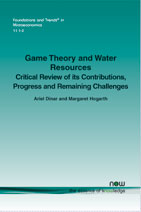Game Theory and Water Resources: Critical Review of its Contributions, Progress and Remaining Challenges
By Ariel Dinar, School of Public Policy, University of California, Riverside, USA, adinar@ucr.edu | Margaret Hogarth, The Claremont Colleges Library, Claremont University Consortium, USA, margaret_hogarth@cuc.claremont.edu
Abstract
Game Theory (GT), both in its non-cooperative (NCGT) and cooperative (CGT) forms, has been pivotal in its contribution to the analysis of important aspects related to water resources. The 1942 seminal work of Ransmeier on The Tennessee Valley Authority is still considered essential; it continues to inspire many applications related to water allocation decisions. Since Ransmeier, GT models were developed and have been applied to various aspects of water management, such as decisions on cost and benefit allocation in multi-objective multi-use water projects, conflicts and joint management of irrigation projects, management of groundwater aquifers, hydropower facilities, urban water supplies, wastewater treatment plants, and transboundary water disputes.
World water resources face new challenges that suggest a renewed role for GT in water management. Scarcity, growing populations, and massive development have led to increased competition over water resources and subsequent elevated pollution levels. Climate change is expected to unevenly affect the hydrological cycle, leading to increased variability in water supplies across time and space and uncertainty in water allocation decisions. Future investments in water resource projects will be astronomical, needing much more stable rules for cost allocations among participating entities and over time. Levels of water disputes may vary from local to regional, state, and international levels. All of these suggest that while GT models and applications to water resources have advanced over the years, much more is expected.
This monograph will review the main contributions of GT in water resources over the past 70 years. It will compare the set of issues faced by water resources and those which the sector is most likely to face in the coming future. Based on this comparison, a future research agenda and priorities will be proposed. Following the literature's time line with a focus on various methodologies, sectoral applications (such as irrigation, hydropower, environmental water uses, navigation, etc.), and regional issues, we will also identify physical and behavioral features in the water sector that might be conducive to GT (such as scarcity, externality, uncertainty, and competition-conflict) and some features of intervention (such as the important role for policy, regulation, and incentives), which all affect the likelihood of GT solutions in terms of acceptability and stability.
Game Theory and Water Resources:
The use of game theory (GT) in water resources by different disciplinary professions including, but not limited to, engineers, international relations experts, economists, and geographers, is vast and impressive. The objective of Game Theory and Water Resources is to collect this vast literature, catalogue it, and provide present and future practitioners of game theory in water resources with a source of information that can be useful for their research. The authors assume that readers of this monograph have the basic skills in game theory, and have kept explanations of game theory concepts to a minimum.
Game Theory and Water Resources introduces the topics and moves onto reporting the historical trends observed in the accumulation of GT publications on water between 1942 and 2013. Section 3 describes the developments in Cooperative GT-methodologies to water issues, whose applications ruled the GT applications during the period 1950-1990. Section 4 reviews the development of Non-Cooperative GT (NCGT) methodologies to various water issues. Section 5 provides a comprehensive review of GT surveys that have been published in the literature. Section 6 reviews Game Theory applications by sub-sector – the authors identify 11 sub-sectors and review the applications of GT approaches to each of them. The monograph ends with a conclusion and identification of remaining problems to be addressed in the future.
